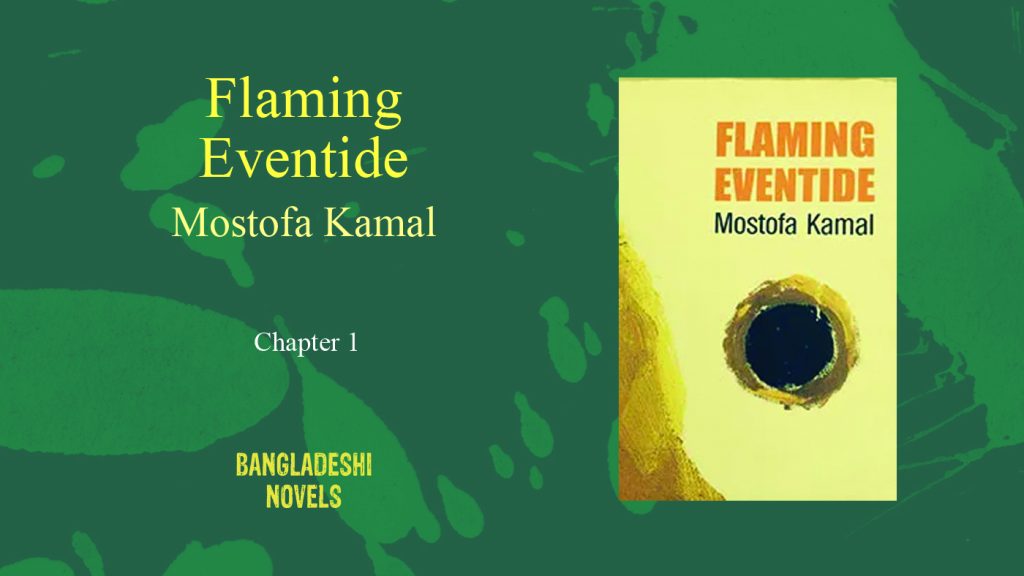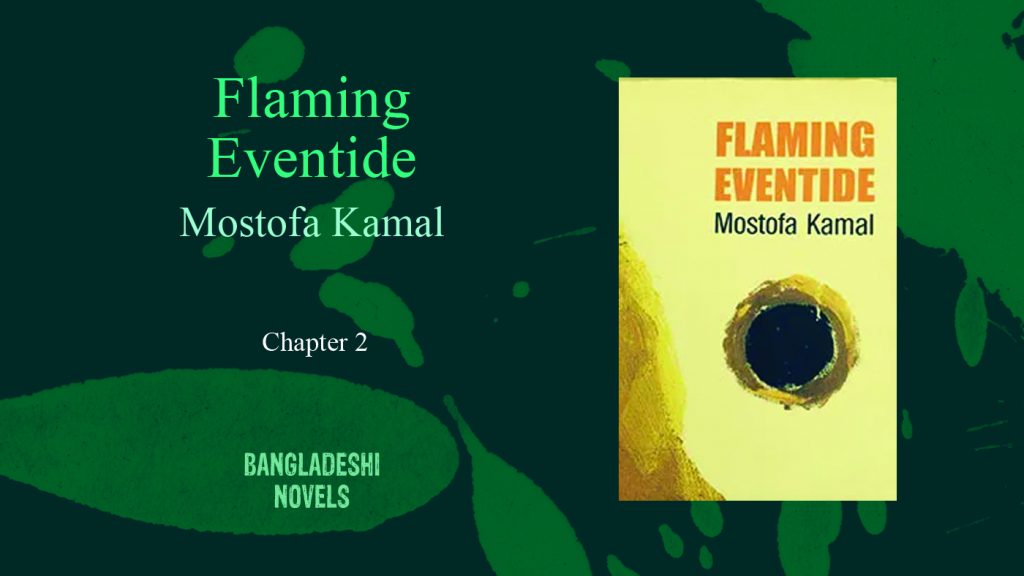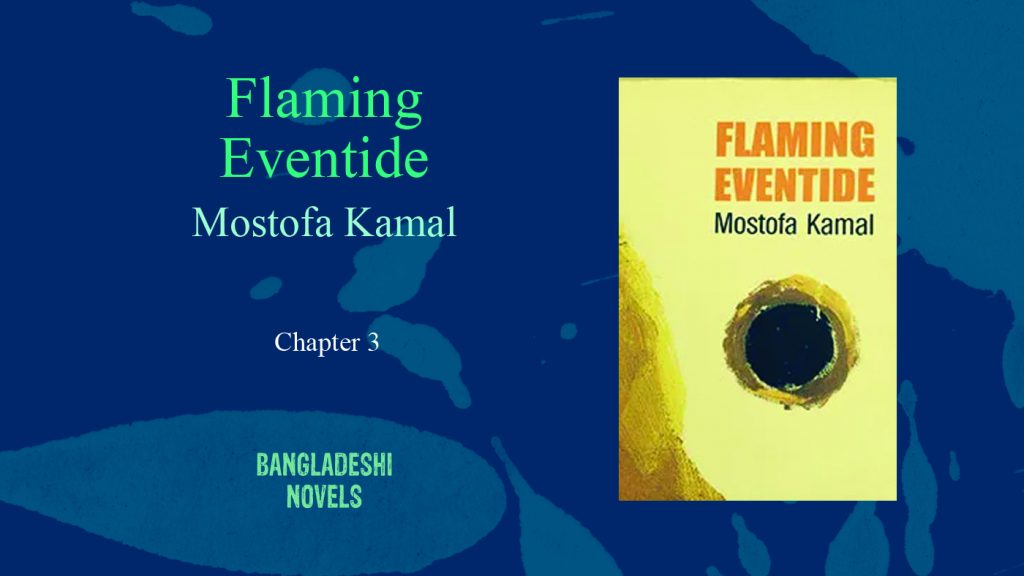
Chapter 2
Winter wasn’t totally over yet. The touch of coolness in the air felt quite good. One evening after travelling in a bus for practically the whole day we reached the tiny riverside suburb called Kaliganj. After crossing the river we would have to go another five miles to reach my grandparent’s house. Dadu had already been informed about our arrival and was supposed to send a bullock cart to carry us home. One of his servants should be waiting for us with the cart on the other side of the river.
As soon as we crossed the river in a wooden rowing boat I saw the shepherd boy who took care of my grandparent’s cattle. His name was Alek Mia. He couldn’t have been older than fifteen. He played the pipe very well and could jump from tree to tree like a monkey. During my visits to dadu’s house a major part of my time would be spent with him. Once he had secretly taken me to the grazing fields with the cattle. My disappearance had stirred up the neighbourhood with everybody searching for me. Several hours later dadi sent a domestic hand to the grazing fields – just in case. I was chasing around the calves with a stick. My safe return was celebrated with my devastated young mother relieving in stream of tears.
That evening after Alek returned from the fields and drove the cattle in the shed next to the courtyard dadu summoned him in the outhouse. Vice president of the union for many years dadu was a well known and respected person. He was a man of little words and much temper. However, I had never seen him hitting anybody. But that night he slapped Alek on the face, once, in front of everybody. He did not say even a single word. Alek was not surprised at all. He knew something of this nature was going to happen. After this incident things changed a little bit between us. We couldn’t spend as much time together as before. Mom took especial effort to keep me away from him. She was a village girl but yet fostered a significant fear about the villagers. She believed that the villagers were simple minded but were also capable of committing heinous crimes. She feared that Alek might try to harm me to take revenge on dadu. That day it was I who had insisted on going with him. He really wasn’t to be blamed.
Few days after that incident we moved to Navaron. Seeing Alek after a while my heart just danced on. He hugged me dearly and picked me up. I could see his eyes tearing up even in the dark. “Why did it take you guys so long?” He couldn’t hide the wetness in his voice. “I was so worried.”
My parents were anxious to get home as soon as possible. The overall situation of the country wasn’t at its best. There was a considerable fear of being robbed on the way. Our luggage was loaded swiftly into the cart and on the road we went. One of my distant uncle lived nearby. We stopped at his place and took one of his workers to accompany us for added security. He lit a hurricane lamp and walked ahead of the cart. Time to time he yelled at the passing pedestrians and cyclists, “Who goes there?”
Inside the covered bullock cart mom and Rushi sat quietly. I sat at the back with my legs hanging out. Dad alternated between walking along with the cart and hopping on the cart to sit beside me. It was getting darker as the night encroached slowly. A crescent moon hung in the sky in the midst of the white clouds. The dirt road meandered through the paddy fields that extended to the horizon. Our cart moved slowly with a laboured sound of the wheels, joining the synchronized sounds of the fireflies to create a unique music. Every now and then isolated cyclists approached us with their bells ringing ‘Cring Cring’ as they leaned forward to get a glimpse of the visitors.
“Where are you heading?” The curious ones asked gently.
“Goneshpur.” Alek Mia or the man with the lamp answered alternately.
“Which house?” The follow up question was inevitable.
“Habibur Morol.”
“Oh!”
Not everybody recognized the man, but some did. They respectfully nodded and went in their own ways. Our cart crawled through villages after villages. We turned west after reaching Pirojpur. If we had gone south for another 3 miles we would get to my mom’s parental house.
Mom had ten uncles from her father’s side. Each of them had at least half a dozen children. Some of their children had grown up and started families. All together they had occupied a full village. My time there went by so quickly! The hoard of cousins ensured that I was never bored. We roamed around the village, played tag in the moonlight on the sprawling courtyard, dared the shady village roads at night to venture to the small convenience store located near the river to buy delicious treat. The freedom was incomparable, memories unforgettable. Of course, none of these would have been possible without my cousin sister Rani. She was twelve and a daredevil. Her reputation had spread far beyond her village. A merited student she was the indisputable leader of the younger kids in the village. Adults trusted her, relied on her. Even my mom stopped worrying about me when I was with her.
I shot a meaningful look toward my dad. He read my mind clearly. “Don’t worry, you’ll visit them,” he said. “I’ll tell your dadu to send you folks to Dorgahpur for a few days.”
“Isn’t that what he wants!” Mom chirped in. “Once there I would barely see him. He would shadow Rani everywhere.”
Dad’s indulgent laughter rippled in the darkness. He had grown up in the villages, roamed around the countryside with his older sister. He knew the feelings.
As we closed on to dadu’s house we met a group of four men: Alek’s dad Shaheed, older brother Moti and couple of young men named Liakot and Rohim, all equipped with bamboo sticks and powerful flashlights. They worked for dadu.
“Alek, is that you? Alek? Hey Alek?” Uncle Shaheed yelled. Traditionally in the villages elderly men are called uncle (chacha) and women aunt (chachi) regardless of any blood relation.
“Father!” Alek answered, relieved.
Shaheed chacha hugged dad. “Why so late? Your father has been so worried that he sent us to check.”
Dad walked with him as he explained the delay due to the irregular bus service. Shaheed chacha had been a long time field hand of dadu and became an integral part of the family over the years. He had no land of his own. Dadu had allowed him to build a hut in one corner of his land close to the main house. Shaheed chacha and his family had lived there for years. He had two sons – Moti and Alek. Moti married a few years back and built another hut near his father’s hut. They all had a special corner for dad. Not only he provided free medical treatment but he had also advocated for them to dadu to allow them to build a shelter in his land.
At dadu’s house we were greeted by a bustling crowd who had gathered in the courtyard. Villagers in this part of the country were impoverished with a few having any kind of education. Most were field hands working for a handful of rich farmers who owned most of the farming lands. Anybody who rose above the ordinary, especially with education, were honoured and loved. When any of these successful children visited, villagers gathered to show their appreciation. Dad was special among specials and his popularity was enviable. Since becoming a licensed physician he had treated the poor villagers for free often handing over medicines free of cost as well. People came from far away, mostly the dirt poor. They took this opportunity to get a free check up, often some free medicines and a reasonably good meal, courtesy of dadi.
Upon our arrival dadi came rushing and hugged both Rushi and me tightly. Clearly she was very worried at our late arrival. That night when everybody left and we could finally get to bed it was already past midnight. In the villages most people went to bed early to save on kerosene cost. Seldom there would be exception to that. When my dad or his older brother Uncle Nowsher (chachu), a renowned teacher in the town of Satkhira, visited exceptions to that rule was made.
Dad left next morning. He had to show up in Jessore Judges court as a witness that day. Before leaving he held me lightly in his arms and said,” Take care of your mother and sister. Okay?”
I nodded with pride. Why won’t I be able to take such minor responsibility? Dad said goodbye to everybody and climbed up the back of a passenger bike, customarily called a helicopter (a regular bike with an extra seat, usually just a flat piece of rectangular wood, attached to the carrier). When only men travelled they primarily used this means of transportation. It was much faster than the bullock carts. I ran alongside the helicopter that carried dad for as long as I could. Slowly the bike rolled away out of sight on the meandering dirt road that disappeared into dense vegetation. I kept on waving until I could make out dad’s silhouette against the rising sun. Tears welled up into my eyes. I wondered when I was going to see him again. He was supposed to go back to Comilla from Jessore. From there he would make the trip to West Pakistan. There was no knowing when we could finally make it there. Alek had been running with me. He quietly picked me up into his lap.
Dad had no difficulty as a witness in the court of justice. He was asked whether he had issued the death certificate, which he answered positively. The hand writing was his. After that none of the parties had too many questions for him. This was his first time in a court. He was sort of nervous. He hadn’t done anything wrong but the lawyers could be tenacious at times. He felt relieved once that part was over.
He made the journey to Comilla the same day. Next morning he called Uncle Nawsher (chachu) in Satkhira to inform that he had reached Comilla safely. Satkhira was only couple of hours from dadu’s house. On the following weekend chachu came down to village himself to deliver the news. Normally important news would get passed on with acquaintances regularly commuting between Satkhira and Kaligonj. On our way to the village we didn’t stop by at chachu’s house. An affectionate person he took this opportunity to visit us in the village. Aunt (chachi) stayed behind to take care of their house and children. They had four daughters, who were studying in school or college. They couldn’t always leave house together even if they wanted to.
When chachu came to the village he took me on his bike and went around the village. He liked to meet the reputed and influential people of the village and exchanged opinions and information. He proudly introduced me as his nephew to everybody. “Rasheed’s son. Greet with Salam, son.”
I would sheepishly murmur a Salam, the Muslim way of greeting. When among familiar faces I could be the loudest, however in the presence of new acquaintances I became almost invisible.
One day he took me to Uncle Motaleb’s house. He was dad’s second cousin. He was big, well built like a wrestler. He used to work out and practiced fighting with bamboo stick. He showed some of his skills to me. He spun a long heavy bamboo stick around him with unbelievable deftness and speed as I observed with disbelief. Having no children of his own he was known for his affection for all children in the village. He invited them in his house and told stories or showed performances with stick. Well known in the region he was considered to be an influential person.
From uncle Motaleb’s house we headed toward the village market of Ratanpur.
“He is a good man but short tempered.” On the way chachu conferred. “Got too many enemies. Beats up people for little things. Just the other day he pounded an insolent young man mercilessly for eve teasing. Later it came out that the young man’s father is an influential person in a nearby village. The time is bad but who is going to explain that to Motaleb?”
I nodded wisely. Chachu did not discuss these matters with everybody. I knew because I shadowed him all through his visits. Not that I had any choice. He wouldn’t go anywhere without me.
The village market in Ratanpur was only a mile away. Riding on the handle of chachu’s bike negotiating the narrow, uneven, tree lined dirt road as we moved closer to the village market I felt an increasing presence of saliva in my mouth. On the south end of the market there were several sweet shops. One of them was Kamal’s who made finger licking rasgulla (small cheese balls soaked in sugary syrup) and hot galebi (a deep fried sweet preparation). Coming to the market with chachu invariably meant getting the taste of Kamal’s sweet. Apparently I had sweet teeth from very early age. Mom said when I was only a year old I screamed for molasses and wouldn’t stop until got a plate full of it. Sweet maker Kamal issued a broad smile at my sight. He stirred up the hot rasgullas floating in sugar syrup in a large deep pan. “How many do you want, son? Two or four? I have fresh galebi. Just made them. Sir, should I pack a kg to take home as well?”
Chachu relaxed into a chair with me by his side. “Sure. Sure. First serve each of us two rasgullas and a pair of galebi. Pack up some for home too. His mom loves your sweet.”
“When did they arrive?”
“Just a few days back. His dad has to go to West Pakistan for training. He dropped them off here. They will stay for a few months. Son, do you want some sondesh (sweetened cottage cheese)? Kamal, go ahead, give us couple of your special sondesh. He is a suck up for sweet things. Have too many stomach worms but I guess a little sweet every now and then won’t do much harm.”
“Sir, my sweet does not give stomach worm. This is Kamal’s special sweet… I tell you sir. Ha… ha… ha… “
Rajab Ali was the owner of the solitary book store located in the market. The clothing store next to his store belonged to Naisur Rahman. Both were chachu’s long time friends. Failing to do well in education they had resorted to business. Sales hadn’t been great but enough to make a living. They had some paddy fields which were rented to landless farmers. In the end they did well though with considerable effort. Regardless both were very ambitious and took strong interest in politics. They would always get into loud discussions about local politics with chachu. Sometimes the national politics sipped in too. Bhutto wasn’t ready to let Mujib to form government. A serious trouble seemed almost unavoidable. It wasn’t quite clear what would be the impact of such events in this remote area. India was nearby, no more than two-three miles, just across the river. How would they react? How was this issue going to be resolved?
All this discussions made me sleepy. Chachu noticed. He was apologetic. “Oh, look how insensitive I am. I forgot about this little boy. What does he understand about politics? Come, Khoka. We’ll go home.”
We took a different route around the village to return home. Bored or not I loved to go around with him. It made me feel important. Who else would strike a serious conversation with me?







